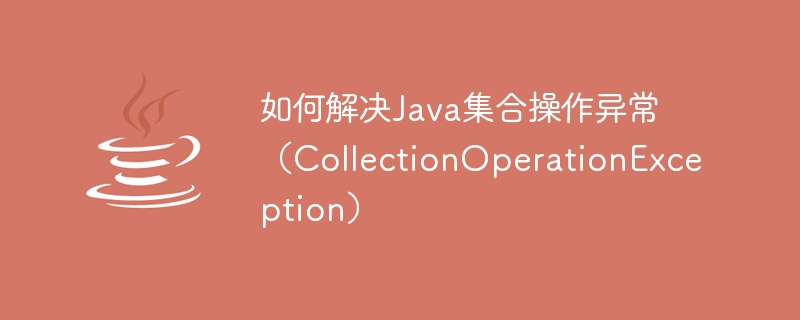Home >Java >javaTutorial >How to solve Java collection operation exception (CollectionOperationException)
How to solve Java collection operation exception (CollectionOperationException)
- PHPzOriginal
- 2023-08-19 08:29:271425browse

How to solve Java collection operation exception (CollectionOperationException)
In Java development, collection operation exception is one of the common problems during the development process. When we use containers in the collection framework for data operations, we often encounter some exceptions. This article will introduce readers to how to solve Java collection operation exceptions and provide code examples.
1. Understand common collection operation exceptions
In the Java collection framework, common collection operation exceptions include the following:
- IndexOutOfBoundsException: When accessing a collection Index range exceeded;
- NullPointerException: A method of an empty object was called in the collection;
- ConcurrentModificationException: When using an iterator to traverse the collection, the collection was modified at the same time;
- UnsupportedOperationException: The collection does not support the current operation;
- ClassCastException: An attempt was made to convert an object to a type that is not a subclass.
2. Solutions and code examples
- IndexOutOfBoundsException
When an IndexOutOfBoundsException exception occurs, it is usually because we are trying to access a collection that does not exist Elements. The way to solve this problem is to first determine whether the index is legal before accessing the element. You can use the size() method to obtain the collection size to avoid crossing the boundary.
List<String> list = new ArrayList<>();
int index = 2;
if(index >= 0 && index < list.size()) {
String element = list.get(index);
// 其他操作
} else {
// 处理索引越界异常
throw new IndexOutOfBoundsException("Index is out of bounds!");
}- NullPointerException
NullPointerException usually occurs when we try to call methods on empty objects. In order to avoid the occurrence of this exception, we should first determine whether the object is null before using it.
List<String> list = null;
if(list != null) {
// 对集合进行操作
} else {
// 处理空指针异常
throw new NullPointerException("List is null!");
}- ConcurrentModificationException
ConcurrentModificationException usually occurs when we use an iterator to traverse a collection and modify the collection at the same time. In order to avoid the occurrence of this exception, you can avoid modification and traversal operations at the same time by using a specialized concurrent collection class.
List<String> list = new ArrayList<>();
Iterator<String> iterator = list.iterator();
while(iterator.hasNext()) {
String element = iterator. next();
// 对集合进行操作,但是不能修改集合元素
}- UnsupportedOperationException
UnsupportedOperationException exception usually occurs when we try to operate on a collection that does not support the current operation. In order to avoid this exception, we should check whether the collection supports this operation before calling the method.
List<String> list = Arrays.asList("a", "b", "c");
if(list instanceof ArrayList) {
// 对ArrayList进行操作
list.add("d");
} else {
// 处理不支持操作异常
throw new UnsupportedOperationException("List does not support this operation!");
}- ClassCastException
ClassCastException exception usually occurs when we try to convert an object to a type that is not its subclass. In order to avoid this exception, we should check the type of the object before performing type conversion.
Object obj = "Hello";
if(obj instanceof String) {
String str = (String) obj;
// 对字符串进行操作
} else {
// 处理类型转换异常
throw new ClassCastException("Object is not of type String!");
}Summary:
This article introduces several common methods to solve Java collection operation exceptions and provides corresponding code examples. During the development process, we should always pay attention to handling exceptions and avoid errors. By understanding collection operation exceptions and applying solutions, we can better ensure the stable operation of Java programs.
The above is the detailed content of How to solve Java collection operation exception (CollectionOperationException). For more information, please follow other related articles on the PHP Chinese website!
Related articles
See more- A brief introduction to an ordered collection that allows duplication List in Java
- Is the set collection in python a variable type?
- IDEA compiles java and prompts that the symbol cannot be found
- What should I do if my mobile phone prompts that the https certificate is abnormal?
- How to convert array to list collection in java?

